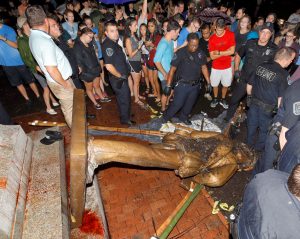
BERLIN (Reuters) – German firemen on Wednesday removed a golden statue of Turkish President Tayyip Erdogan on security grounds after it provoked an angry response from local people.
Organizers of an arts festival whose theme this year is “Bad News” had installed the four-meter statue of Erdogan, with one arm outstretched, on a plinth in the central Square of German Unity in the western town of Wiesbaden on Monday.
But the statue got daubed with graffiti, including the slogan “Turkish Hitler”, German media reported, and a few hundred residents had protested against it.
Police said they could no longer guarantee people’s safety so firemen used a large crane to take away the statue under the cover of darkness in the early hours of Wednesday.
Some three million people with Turkish roots live in Germany and Erdogan, who in June won re-election with expanded powers, is due to make a state visit to Berlin on September 28-29 as part of efforts to improve relations strained by years of disagreement on a range of issues.
Germany condemned Turkey’s arrest of some 50,000 people and the suspension or firing of 150,000 others including teachers, judges and soldiers, after a failed coup against Erdogan in 2016. Berlin says the crackdown was excessive and harmed basic freedoms. Ankara says it acted to safeguard national security.
“It is certainly appropriate to conceive of Erdogan as a controversial figure, and one that we are allowed to discuss freely here in this country,” the director of the biennial festival, Uwe Eric Laufenberg, told Reuters when the statue was erected on Monday.
“We can have a discussion about this statue and this man.”
While some residents liked the statue, others objected.
“This is a man who has hundreds of people on his conscience… because he has lied and bought his way to power. He’s a dictator,” said resident Werner Starotsta.
(Reporting by Reuters TV; Writing by Madeline Chambers; Editing by Gareth Jones)


